WARNING: Obnoxious parental bragging forthcoming…
My 13-year-old daughter is an amazing singer. Like, legit.
I know, I know. Every parent thinks their kid is special – and they’re right. But Maddie is the real deal. She first performed on stage at age 7. By 11, she was singing the National Anthem at Pittsburgh Pirates and Penguins games and, at 12, performing for President George W. Bush and ballrooms full of celebs. Trust me. Just listen to the last 30 seconds of any of those clips.
While that seems like a lot for a little kid to have on her plate, we’ve held her back from much more. She’s had calls from Broadway agents, offers to skip public auditions for TV talent competition shows (yes, that happens), and repeated requests to be featured on the local news. We say no to all of that stuff. And, ever since we made her sit through a Powerpoint presentation I created about Macauley Caulkin, Judy Garland, and Lindsay Lohan when she was 10, she’s never argued with us. Childhood stars who grow into successful, well-adjusted adults are the very rare exception, not the rule.
As I look around me though, I wonder if our family’s philosophy is the exception. You can’t turn on the TV without seeing kids paraded around on reality shows. Every time a movie is filmed in Pittsburgh, hundreds of parents and kids stand in line all day, in the hopes of being discovered. Even in Maddie’s musical theater program, kids are being pushed by parents who want success for their kids more than the kids want it themselves.
I’ve wondered if our family is in the minority. So, I decided to survey a representative sample of U.S. adults (25+) to see what the consensus really is. Here’s what I found:

For a moment, my faith in humanity has been renewed. The people who would prefer that their kids have “a normal childhood” outnumber those who think fame for their child “would be great” by a significant margin.
And yet, the fact that 30% of Americans would still wish fame on their children – despite endless cautionary tales – surprises me. Who are these people? Are they trying to live vicariously through their kids because of dreams they never reached? Do they view it as a path toward riches? I dug a little deeper into the numbers.
Our group of fame-seekers was much more likely to be men (see: Michael Lohan). Age had almost no bearing on the results, although Gen Xers were slightly more likely to be fame-seekers. Surprisingly, household income was completely irrelevant, though more educated respondents were more likely to be fame-rejectors. Fame-seekers were far more likely to live in an urban area.
Beyond demographics, I found a few correlations that are worth contemplating. Fame-seekers are 75% more likely than average to watch CBS for network TV – strange because I would have guessed NBC, home of the Voice and America’s Got Talent. Respondents who are “much taller than most people” were 56% more likely to be fame-rejectors, perhaps because they know what it’s like to stand out.
I also looked at celebrity preferences and didn’t find anything. I thought maybe fame-seekers would be more celebrity-crazed. They’re not.
But, fame-seekers ARE 43% more likely than average to consider themselves “addicted” to their digital device and spend 2+ hours per day on social media. They’re more likely to be daily users of Instagram but not YouTube; Twitter but not Facebook. And this is probably no surprise…

The more somebody watches reality TV, the more likely they are to be in our fame-seeker group. Of course.
All of that tells me that being a fame-seeker isn’t about age, or income, or celebrity-loving, or any other obvious proxy trait. Fame-seeking is an attribute all of its own, enabled and fed by social media, smartphones, and reality TV. Some people simply view fame as a virtue of its own.
I’m just glad they’re still in the minority.








